Héctor Jose Ferrer Ríos was a Puerto Rican politician and attorney. He served as a legislator in the House of Representatives of Puerto Rico from 2001 to 2012 for three consecutive terms. He was the president of the Popular Democratic Party of Puerto Rico (PPD) from 2008 to 2011, and later from 2017 to October 2018

The Popular Democratic Party is a political party in Puerto Rico that advocates to continue as a Commonwealth of the United States with self-governance. The party was founded in 1938 by dissidents from the Puerto Rican Liberal Party and the Unionist Party and originally promoted policies on the centre-left. In recent years, however, its leaders have described the party as centrist.

General elections were held in Puerto Rico on Tuesday, November 6, 2012, to elect the officials of the Puerto Rican government that would serve for the next four years, including the governor, resident commissioner and members of the Legislative Assembly. A status referendum was held on the same date.
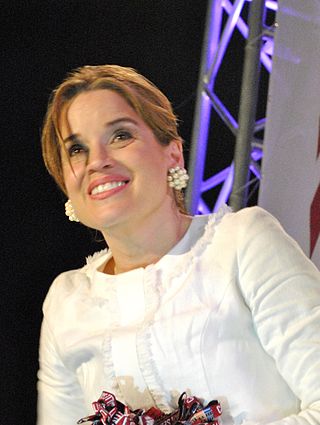
Carmen Yulín Cruz Soto is a Puerto Rican politician who served as mayor of the city of San Juan, Puerto Rico from 2013 to 2020. From 2009 through 2013, Cruz served in the House of Representatives of Puerto Rico.
A referendum on the political status of Puerto Rico was held in Puerto Rico on November 6, 2012. It was the fourth referendum on status to be held in Puerto Rico. Puerto Rico has been an unincorporated territory of the United States since the Spanish–American War in 1898.

The free association movement in Puerto Rico refers to initiatives throughout the history of Puerto Rico aimed at changing the current political status of Puerto Rico to that of a sovereign freely associated state. Locally, the term soberanista refers to someone that seeks to redefine the relationship between Puerto Rico and the United States to that of a compact with full sovereignty. The term is mostly used in reference to those that support a compact of free association or a variation of this formula, commonly known as Estado Libre Asociado (ELA) Soberano, between Puerto Rico and the United States. Members of the independence movement that are willing to pursue alliances with this ideology are occasionally referred to as such, but are mostly known as independentistas. Consequently, soberanismo then became the local name for the free association movement.
Eduardo Ferrer Ríos is a Puerto Rican politician. He was elected to the Puerto Rico House of Representatives in the 2012 general election. Ferrer is the brother of former Representative and President of the PPD Héctor Ferrer.
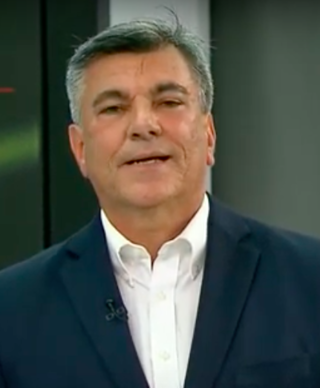
Carlos “Charlie” Delgado Altieri is a Puerto Rican politician who served as the mayor of Isabela from 2001 to 2021. He has also served as the president of the Popular Democratic Party since August 20, 2020 until February 23, 2021. He was the Popular Democratic Party nominee for Governor of Puerto Rico in 2020, losing to New Progressive Pedro Pierluisi. He is also a candidate for the 2024 Puerto Rico gubernatorial election.
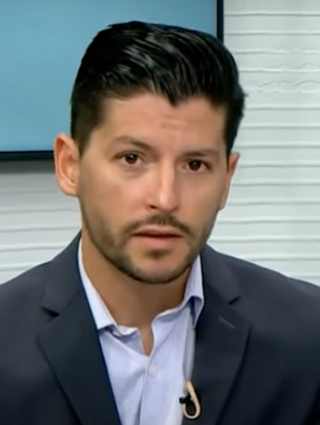
Manuel Antonio Natal Albelo is a former member of the 29th House of Representatives of Puerto Rico. Natal is currently affiliated with the Citizen's Victory Movement party after being previously affiliated with the Popular Democratic Party and a legal advisor for Charlie Hernández, another member of the House, before becoming a legislator. He was a member of the free association movement, colloquially known as soberanistas. Elected at the age of 27, Natal is one of the youngest legislators in the history of Puerto Rico and was the youngest legislator to serve at the time of his election. He was the Movimiento Victoria Ciudadana party's nominee in the 2020 San Juan mayoral election, which he lost to senator Miguel Romero of the New Progressive Party.
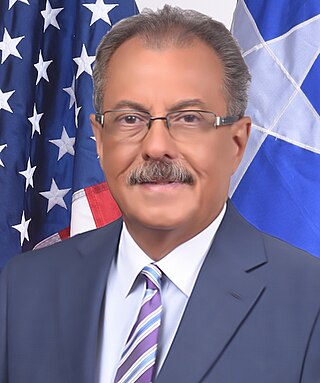
Juan Clemente Zaragoza Gómez is a certified public accountant who has been a member of the Puerto Rico Senate since 2021 and served as the former Secretary of Treasury of Puerto Rico.

General elections were held in Puerto Rico on Tuesday, November 8, 2016, to elect the officials of the Puerto Rican government to serve from January 2017 to January 2021, most notably the Governor of Puerto Rico. Ricardo Rosselló was elected governor and Jenniffer González-Colón was elected Resident Commissioner. The elections saw a 23 percentage point drop in turnout and was the lowest voter turnout in Puerto Rican history.

During the first two decades of the 21st Century, the concept of a sovereign form of association has experienced its largest growth since it was first proposed. The 2000s marked the first time that an incumbent governor ran on a platform advocating sovereignty, when Aníbal Acevedo Vilá did so for the Popular Democratic Party (PPD). The term soberanista was popularized as a consequence, and the ideological breach within the party widened as the conservative wing backed the territorial Commonwealth. During the 2010s, free association recorded its best performance at the polls, finishing as runner-up of the 2012 status referendum. This decade also marked the first time that another party presented supporters of free association in the ballot, with the participation of the Movimiento Unión Soberanista (MUS).

Movimiento Victoria Ciudadana is a Puerto Rican political party founded in 2019. It ran in the 2020 general elections on an anti-colonial platform, proposing a constitutional assembly to determine a final decision regarding the relationship between the United States and Puerto Rico.

A referendum of the status of Puerto Rico was held on November 3, 2020, concurrently with the general election. The Referendum was announced by Puerto Rico Governor Wanda Vázquez Garced on May 16, 2020. This was the sixth referendum held on the status of Puerto Rico, with the previous one having taken place in 2017. This was the first referendum with a simple yes-or-no question, with voters having the option of voting for or against becoming a U.S. state. The New Progressive Party (PNP), of whom Vázquez is a member, supports statehood, while the opposition Popular Democratic Party (PDP) and Puerto Rican Independence Party (PIP) oppose it.
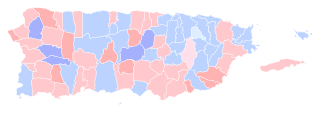
General elections were held in Puerto Rico on November 3, 2020, to elect the officials of the Puerto Rican government who will serve from January 2021 to January 2025, most notably the position of Governor and Resident Commissioner. In addition, there was a non-binding status referendum to ask voters if Puerto Rico should become the 51st state of the Union.

San Juan, Puerto Rico, held an election for mayor on November 3, 2020. Among other elections, it was held concurrently with the 2020 Puerto Rico general election. It saw the election of New Progressive Party nominee Miguel Romero.

Gubernatorial elections were held on Tuesday, November 5, 2024, to elect the governor of Puerto Rico, concurrently with the election of the Resident Commissioner, the Senate, the House of Representatives, and the mayors of the 78 municipalities. This election is historic as it marks the first time since 1952 in which a candidate from the Puerto Rican Independence Party came runner-up in a gubernatorial race, the first time since 1964 in which the incumbent governing party was re-elected after two terms in office, the second time Puerto Rico has elected a female governor, with the first time being in 2000 with Sila María Calderón. This election also saw the Popular Democratic Party lose control of the Legislative Assembly of Puerto Rico and finish third for the first time in its entire history in a gubernatorial election, albeit retaining a majority of mayoral races and its candidate for Resident Commissioner, Pablo Hernández Rivera, won in a landslide.

The 2020 Puerto Rican municipal election was held on November 3, 2020, to elect the mayors of the 78 municipalities of Puerto Rico, concurrently with the election of the Governor, the Resident Commissioner, the Senate, and the House of Representatives. The winners were elected to a four-year term from January 3, 2021, to January 3, 2025.

The 2024 United States House of Representatives election in Puerto Rico to elect the Resident Commissioner of Puerto Rico were held on November 5, 2024. The election of the Resident Commissioner was held concurrently with the larger 2024 United States House of Representatives elections, the 2024 Puerto Rico gubernatorial election, and other U.S. federal and Puerto Rican general election races.

The 2024 Puerto Rican municipal election was held on November 5, 2024, to elect the mayors of the 78 municipalities of Puerto Rico, concurrently with the election of the Governor, the Resident Commissioner, the Senate, the House of Representatives, a Status referendum and a Presidential straw poll. The winners were elected to a four-year term from January 3, 2025, to January 3, 2029.















